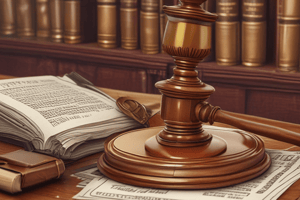Podcast
Questions and Answers
What is the difference between Acts of Parliament, Provincial Acts, and municipal by-laws?
What is the difference between Acts of Parliament, Provincial Acts, and municipal by-laws?
Acts of Parliament are national legislation, Provincial Acts are provincial legislation, and municipal by-laws are local legislation.
What is subordinate/delegated legislation?
What is subordinate/delegated legislation?
Subordinate/delegated legislation is law enacted by a person or body under the authority of a power granted by primary legislation, also known as the 'enabling' legislation.
What is the key principle regarding the relationship between subordinate legislation and its enabling legislation?
What is the key principle regarding the relationship between subordinate legislation and its enabling legislation?
Subordinate legislation cannot be in conflict with its enabling original legislation.
What happens if the enabling Act is declared unconstitutional?
What happens if the enabling Act is declared unconstitutional?
What happens if the enabling Act is repealed?
What happens if the enabling Act is repealed?
What is the rule regarding who can repeal or amend their own legislation?
What is the rule regarding who can repeal or amend their own legislation?
What is the difference between legal interpretation and statutory interpretation?
What is the difference between legal interpretation and statutory interpretation?
What is the purpose of using 'legalese', the specialized language used by lawyers in legal documents?
What is the purpose of using 'legalese', the specialized language used by lawyers in legal documents?
What are the five primary sources of law discussed in the text?
What are the five primary sources of law discussed in the text?
What is the difference between a decision and a judgment in case law?
What is the difference between a decision and a judgment in case law?
What is the difference between binding authority and persuasive authority in case law?
What is the difference between binding authority and persuasive authority in case law?
What is the difference between the ratio decidendi and obiter dictum in a court's judgment?
What is the difference between the ratio decidendi and obiter dictum in a court's judgment?
What is the key principle regarding Parliament's ability to delegate its legislative power?
What is the key principle regarding Parliament's ability to delegate its legislative power?
What is the difference between Parliament repealing or amending an Act of Parliament versus repealing subordinate legislation?
What is the difference between Parliament repealing or amending an Act of Parliament versus repealing subordinate legislation?
Which of the following are considered legislation and why?
Which of the following are considered legislation and why?
What is the key difference between primary and subordinate legislation?
What is the key difference between primary and subordinate legislation?
Why are common law, case law, and policy documents not considered legislation?
Why are common law, case law, and policy documents not considered legislation?
What is the key principle regarding the law of general application?
What is the key principle regarding the law of general application?
What is the definition of legislation according to the text?
What is the definition of legislation according to the text?
When does legislation remain in force?
When does legislation remain in force?
What happened to legislation before 1806 in South Africa?
What happened to legislation before 1806 in South Africa?
How is old-order legislation categorized in the text?
How is old-order legislation categorized in the text?
What is the territorial application of old-order legislation according to the Constitution?
What is the territorial application of old-order legislation according to the Constitution?
What is the hierarchical order of legislation mentioned in the text?
What is the hierarchical order of legislation mentioned in the text?
Flashcards are hidden until you start studying
Study Notes
Hierarchical Structure of Legislation
- Legislation can be categorized into three tiers: national (Acts of Parliament), provincial (Provincial Acts), and local (municipal by-laws)
- National legislation is enacted by Parliament, provincial legislation by provincial legislatures, and local legislation by municipal councils
Primary and Subordinate Legislation
- Primary legislation refers to Acts of Parliament and Provincial Acts enacted by a democratically elected body during a plenary session
- Subordinate legislation is enacted by a person or body under the authority of a power granted by primary legislation (e.g. provincial proclamations, ministerial regulations, university statutes)
- Subordinate legislation exists and derives its power and authority from primary legislation
Principles of Subordinate Legislation
- Subordinate legislation cannot conflict with its enabling primary legislation
- Subordinate legislators can only issue legislation within the framework of authority bestowed by the enabling legislation
- If the enabling Act is declared unconstitutional, subordinate legislation will cease to exist, unless the court orders otherwise
- If the enabling Act is repealed, subordinate legislation will cease to exist, unless the new Act expressly provides otherwise
- Only the fit and proper legislature can repeal or amend its own legislation
Legislation and the Constitution
- The Constitution is the supreme law of the land (lex fundamentalis)
- Legislation is subject to constitutional supremacy
- Parliament cannot delegate the power to amend or repeal an Act of Parliament to a subordinate legislator
Primary Sources of Law
- The Constitution
- Legislation (primary and subordinate)
- Common law and customary law
- Case law
Status and Hierarchy of Legislation
- Constitution > Primary legislation > Subordinate legislation
- Constitution is the highest authority, followed by primary legislation, and then subordinate legislation
What is Not Legislation?
- Common law
- Case law
- Practice and interpretation notes
- Explanatory memoranda
- Policy documents (White and Green papers)
- Departmental memoranda
- Uncodified indigenous law
- Legal opinions
- Circulars
- Resolutions of Parliament
- These are not enacted by authorized lawmakers and are therefore not legislation
Studying That Suits You
Use AI to generate personalized quizzes and flashcards to suit your learning preferences.




